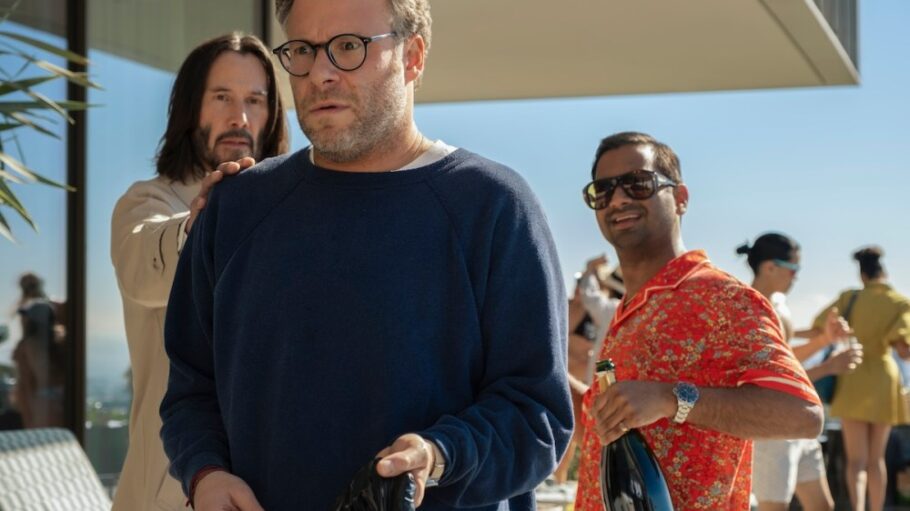It wasn’t meant as a joke when a Hollywood studio cast Nicolas Cage as an emo angel who risks his wings to save Meg Ryan, a mortal with dark thoughts and great hair. But Aziz Ansari must have been smiling when he chose Keanu Reeves to play a similar character, an angel named Gabriel who oversteps his duties with a “lost soul,” in his feature directing debut, “Good Fortune.” It’s a fun idea, whether or not Gen-Z audiences know “City of Angels,” the late-’90s remake of “Wings of Desire,” or the even earlier John Landis classic “Trading Places.”
In what amounts to a slightly ironic but mostly sincere homage to late-20th-century high-concept studio movies (the body-swap comedy in particular), Ansari plays Arj, a gig economy worker with an understandably exasperated view of life in Los Angeles. Running errands for rich people on Taskrabbit, he barely earns enough to eat, and lacks the self-confidence to flirt with Elena (Keke Palmer), a formidably idealistic co-worker at his Home Depot-style second job.
Arj wonders why he went to college as he spends most nights sleeping in his beat-up car, which eventually gets towed for too many unpaid parking tickets. For Gabriel, Arj’s many humiliations add up to someone badly in need of his help. And besides, Gabriel’s bored of his low-ranking angel duties, which amount to stopping Angelenos from texting and driving (he doesn’t realize just how many lives he’s saving).
Coaching the L.A. angels, Gabriel’s boss (Sandra Oh) warns him that he has no business intervening, but Gabriel’s not so bright — Reeves plays the character with much the same blank stare he brought to “Bill and Ted’s Excellent Adventure” all those years back — and appears to Arj anyway. (No one else can see him.) When Arj doesn’t seem thrilled by brief visions of what his life has in store, Gabriel lets him temporarily trade places with Jeff (Seth Rogen), a rich tech bro he’d met a few days earlier.
There’s just one problem: Arj doesn’t want to go back. Would you, if offered the choice between scraping by (as so many barely can these days) and planning parties from the private sauna of your Hollywood Hills mansion?
It’s funny that Gabriel didn’t anticipate this problem — that Arj might not agree “how superficial a life of wealth and success really is” — and funnier still when you see Gabriel’s incredulous expression. No question that Reeves, who has made self-aware cameos in everything from “Toy Story 4” to “Always Be My Maybe” of late, is this movie’s MVP. The surest sign of the good-sport star’s intelligence is his willingness ow endearingly he can play a “dum-dum.”
Ansari understands that the whole angel thing was corny back when Warren Beatty and John Travolta tried it (in “Heaven Can Wait” and “Michael,” respectively), but uses it the way an “SNL” sketch might, as shorthand for the point he really wants to make: Beneath the jokes, “Good Fortune” serves as a working-class critique of contemporary capitalism, as seen from the perspective of those juggling various side hustles just to make ends meet. The comedian might not be this generation’s Frank Capra, but it’s still nice to see a celebrity who recognizes what normal folks are going through and uses his platform to address it (à la Cheech Marin’s newly relevant “Born in East L.A.”).
Love Film & TV?
Get your daily dose of everything happening in music, film and TV in Australia and abroad.
The rules of how Arj and Jeff change places, and what it’ll take to switch back, are sort of a moving target in “Good Fortune,” which gives Rogen’s character an Ebenezer Scrooge-like crash course in how to be a better billionaire by forcing him to work for his own food-delivery app. But after making the joke that Arj kinda likes being rich, Ansari’s screenplay never really presents a convincing reason why this selfish guy would return to how things were before — unless you count Palmer’s union-organizing love interest, whose texting-and-driving mishap Gabriel was somehow supposed to prevent (one of several plot holes).
The movie features a weird mix of acting styles, from Rogen’s appropriately showboaty performance (his character is privilege personified, at first, then later made relatable as he’s forced to break into his own home) to Ansari’s weirdly self-conscious character, who looks uncomfortable on camera, whether Arj is rich or poor. And then there’s Reeves’ amusingly stiff take on Gabriel, who starts to relax once he’s fired from angel duty and forced to get a dishwashing job on earth.
Gabriel discovers the little things other people take for granted — namely, cigarettes, dancing and “chicken nuggies” — but it’s street tacos he’ll miss most if he ever gets his wings back. Even though it’s fairly obvious where “Good Fortune” is headed, Ansari manages to surprise in how he gets there. Like his character, the writer-director-producer-star seems to be juggling one too many jobs here, and yet, it’s that very connection to overworked, undercompensated Americans that makes his movie so right for this moment.
From Variety US































